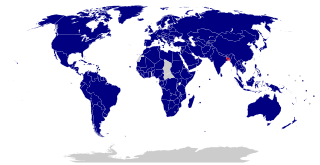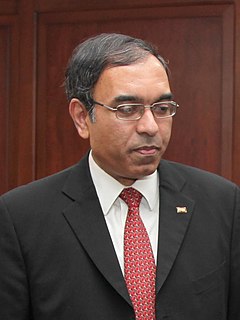Related Research Articles

The foreign relations share the Bangladeshi government's policies in its external relations with the international community. The country pursues a moderate foreign policy that places heavy reliance on multinational diplomacy, especially at the United Nations and World Trade Organization (WTO). Since independence in 1971, the country has stressed its principle of "Friendship towards all, malice towards none" in dictating its diplomacy. As a member of the Non-Aligned Movement, Bangladesh has tended to not take sides with major powers. Since the end of the Cold War, the country has pursued better relations with regional neighbours.

ASEAN, officially the Association of Southeast Asian Nations, is a political and economic union of 10 member states in Southeast Asia, which promotes intergovernmental cooperation and facilitates economic, political, security, military, educational, and sociocultural integration between its members and countries in Asia-Pacific. ASEAN's primary objective was to accelerate economic growth and through that social progress and cultural development. A secondary objective was to promote regional peace and stability based on the rule of law and the principle of United Nations charter. With some of the fastest growing economies in the world, ASEAN has broadened its objective beyond the economic and social spheres. In 2003, ASEAN moved along the path of the European Union by agreeing to establish an ASEAN community comprising three pillars: the ASEAN security community, the ASEAN economic community, and the ASEAN socio-cultural community. The ten stalks of rice in the ASEAN flag and insignia represent the ten southeast Asian countries bound together in solidarity.

The Shanghai Cooperation Organisation (SCO), also known as the Shanghai Pact, is a transcontinental political, economic, security, and military alliance. In terms of geographic scope and population, it is the world's largest regional organization, covering approximately 60% of the area of Eurasia, 40% of the world population, and more than 30% of global GDP.

The South Asian Association for Regional Cooperation (SAARC) is the regional intergovernmental organization and geopolitical union of states in South Asia. Its member states are Afghanistan, Bangladesh, Bhutan, India, Maldives, Nepal, Pakistan, and Sri Lanka. SAARC comprises 3% of the world's land area, 21% of the world's population and 5.21% of the global economy, as of 2021.

The South Asian Free Trade Area (SAFTA) is a 2004 agreement that created a free-trade area of 1.6 billion people in Afghanistan, Bangladesh, Bhutan, India, the Maldives, Nepal, Pakistan and Sri Lanka with the vision of increasing economic cooperation and integration.

The Bay of Bengal Initiative for Multi-Sectoral Technical and Economic Cooperation (BIMSTEC) is an international organisation of seven South Asian and Southeast Asian nations, housing 1.73 billion people and having a combined gross domestic product of US$4.4 trillion (2022). The BIMSTEC member states – Bangladesh, Bhutan, India, Myanmar, Nepal, Sri Lanka, and Thailand – are among the countries dependent on the Bay of Bengal.
The SAARC Consortium on Open and Distance Learning(SACODiL) is a regional cooperation agency set up under the auspices of the South Asian Association for Regional Cooperation (SAARC) with the objectives of promoting cooperation and collaboration among institutions imparting knowledge through open and distance learning within member states, and promoting its use as a viable and cost-effective method of imparting quality education at all levels.
Abul Ahsan was a Bangladeshi diplomat.

Kant Kishore Bhargava is an Indian diplomat who served as the second secretary-general of the South Asian Association for Regional Cooperation (SAARC) from October 17, 1989 to December 31, 1991. He emigrated to Canada in 1998.
The Treaty of Amity and Cooperation in Southeast Asia (TAC) is a peace treaty among Southeast Asian countries established by the founding members of the Association of Southeast Asian Nations (ASEAN), a geo-political and economic organisation of 10 countries located in Southeast Asia.

Secretary-General of the South Asian Association for Regional Cooperation, is head of a SAARC Secretariat, which is headquartered in Kathmandu, Nepal. SAARC is an economic and geopolitical union between the eight South Asian member nations, Afghanistan, Bangladesh, Bhutan, India, Maldives, Nepal, Pakistan and Sri Lanka. Secretary-General is appointed for a three-year term by election by a council of Ministers from member states. Secretary-General is assisted by eight deputies, one from each nation, who also reside in Kathmandu. SAARC Secretariat was established in Kathmandu on 16 January 1987 by Bangladeshi diplomat Abul Ahsan, who was its first Secretary-General, and was inaugurated by King Birendra Bir Bikram Shah of Nepal. Since its creation, its member nations have contributed to a total of fourteenth General Secretaries. Sri Lanka's diplomat Esala Weerakoon is the current Secretary-General, having assumed charge on 1 March 2020.

The South Asia Subregional Economic Cooperation (SASEC) Program, set up in 2001, brings together Bangladesh, Bhutan, India, Maldives, Myanmar, Nepal, and Sri Lanka in a project-based partnership to promote regional prosperity by improving cross-border connectivity, boosting trade among member countries, and strengthening regional economic cooperation. As of June 2020, SASEC countries have implemented 61 regional projects worth over $13 billion in the energy, transport, trade facilitation, economic corridor development, and information and communications technology (ICT) sectors. The Manila, Philippines-based Asian Development Bank (ADB) serves as the Secretariat for the SASEC member countries.

The Bangladesh, Bhutan, India, Nepal (BBIN) Initiative is a subregional architecture of countries in Eastern South Asia, a subregion of South Asia. It meets through official representation of member states to formulate, implement and review quadrilateral agreements across areas such as water resources management, connectivity of power, transport, and infrastructure.
Virendra Dayal is a retired Indian Administrative Service officer and United Nations civil servant who served as Chef de Cabinet to Secretary General of the United Nations for more than a decade. He has served as the director of the Department of Political and Peacebuilding Affairs of the United Nations and as the special envoy who probed the allegations levelled against a number of India politicians including Natwar Singh, a former Minister of External affairs, in the Paul Volcker Committee report of 2005. A former Indian Administrative Service officer and a Rhodes Scholar of 1956 Dayal sat on the National Human Rights Commission of India as a member for two terms from 1998 to 2006. The Government of India awarded him the third highest civilian honour of the Padma Bhushan, in 1992, for his contributions to society.

Abul Kalam Abdul Momen is a Bangladeshi economist, diplomat, politician and the Minister of Foreign Affairs of Bangladesh. He was Bangladesh's Permanent Representative to the United Nations in New York from August 2009 to October 2015. He won the 2018 Bangladeshi general election from Sylhet-1 constituency. In 2019, he was appointed the minister of foreign affairs of the Government of Bangladesh.

Masud Bin Momen is the foreign Secretary of Bangladesh. He is a career Bangladeshi diplomat. He served as an Ambassador and Permanent Representative of Bangladesh to the United Nations. He previously served as Bangladesh's Ambassador to Japan and as Bangladesh's Ambassador to Italy.
A. H. S. Ataul Karim was a Bangladesh diplomat, foreign secretary, and former Ambassador of Bangladesh to the United States. He is a former Permanent Representative of Bangladesh to the United Nations.
References
- ↑ "Former Secretaries General of SAARC". South Asian Association for Regional Cooperation. Archived from the original on September 27, 2007. Retrieved 23 January 2010.
- ↑ "Roll of Honour". High Commission of Bangladesh in Islamabad. 2019. Archived from the original on 12 May 2021. Retrieved 28 August 2021.